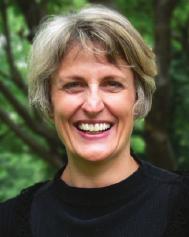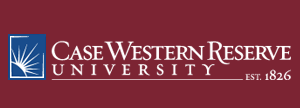
Photo by Vera Tobin
When Anne Helmreich, associate professor of art history, joined the Arts and Sciences faculty in 2004, she participated in a weekly seminar exploring the topic of homelands and security. Her colleagues included other faculty members as well as visiting artists, community leaders, and two guest scholars who presented public lectures and exhibitions that fall. The experience introduced Helmreich to the Baker-Nord Center for the Humanities, which had organized the seminar to serve its twofold mission: fostering humanities scholarship and artistic pursuits at Case Western Reserve University, and sparking interest in these endeavors in the larger Cleveland community.
Now, as the Baker-Nord Center enters its twelfth year, Helmreich has become its director. She succeeds Timothy K. Beal, Florence Harkness Professor of Religion, who had served in the post since 2003. A scholar of Western European art from the mid-eighteenth through the early twentieth centuries, Helmreich also pursues several interdisciplinary interests, including the history of photography, gender studies, and museum studies. She was the Baker-Nord Center's associate director in 2006-07.
Expanded Programming
The Baker-Nord Center for the Humanities was established in 1996 with an endowment gift from Jane Baker Nord (GRS '76) and Eric J. Nord (CIT '39). Over the past three years, it has received additional support in the form of Presidential Initiative Funds provided to the university by The Cleveland Foundation. This support enabled the Center to create the annual Baker-Nord Seminar that Helmreich joined during her first year in the College. Every fall, a new cohort of seminar participants gathers on campus to examine a general theme—such as "Childhood," "Information," or "Medical Humanities"—from a variety of disciplinary perspectives. Then in the spring, the Center sponsors Humanities Week, a series of public lectures and discussions, films, exhibitions, and performances devoted to that same theme.
The Presidential Initiative Funds allowed the Center to expand its support for arts and humanities scholarship in several other ways as well. For instance, the Center has awarded up to ten travel grants each year to faculty members conducting research abroad, as well as dissertation completion fellowships to outstanding doctoral students. Additional programs and activities have been funded by the Center's endowment. These include pre-dissertation research grants, monthly Work-in-Progress colloquia in which faculty members present their research, and a recently launched panel discussion series that provides faculty and students with practical advice on such topics as "Getting Published" and "Getting Funded."
Finally, the Baker-Nord Center has expanded its collaborations with other College programs, with University Circle institutions, and with local foundations and arts organizations. For three years now, for instance, the Center has joined with The Cleveland Foundation and with SAGES to sponsor the Anisfield-Wolf/SAGES Lecture, a public event held in Severance Hall in connection with the Anisfield-Wolf Book Awards.
Cityscapes
The Center's connections to the community will be enhanced this fall as the Baker-Nord Seminar takes up the theme of "Cityscapes." As Helmreich explains in this year's Baker-Nord preview book, "The seminar aims to explore the city as a crucible of creative change, investigating its roles in human cultures in the past and envisioning possible futures. The latter is especially significant for our historic moment when many cities, particularly older cities like Cleveland, face profound shifts in population, infrastructure, politics, and self-identity, among other issues."

Clark Hall, the home of the Baker-Nord Center, was
renovated in 1999 with a gift from Eric and Jane Nord.
Photo by Susan Griffith.
Nine College faculty members will join the seminar, along with participants from the Mandel School of Applied Social Sciences, the College of Architecture and Environmental Design at Kent State University, and The Cleveland Institute of Art. In addition, the Center has appointed three visiting fellows who will participate in the seminar and give public lectures this fall. They are Robert Bruegmann, professor of art history, architecture, and urban planning at the University of Chicago at Illinois; Thomas Sugrue, Edmund J. and Louise W. Kahn Professor of History and Sociology at the University of Pennsylvania; and Carl Pope, a conceptual artist whose installations have been exhibited at the Museum of Modern Art, the Whitney Museum of American Art, and the Museum of Contemporary Photography in Chicago.
Digital Humanities
For a new "Contemporary Thinkers" series, the Center has begun taping the Baker-Nord Visiting Fellows' public lectures and interviewing them about their research interests. "The visiting scholars have been wonderfully forthcoming in explaining how they became interested in a topic and why it is important to them," Helmreich says. The lectures and interviews are now available on the Baker-Nord website (www.bakernord.org), for both teaching and reference purposes.
In another Internet initiative, the Center is sponsoring virtual workshops (informally known as "wikshops") that engage College faculty members with colleagues from other institutions. Participants communicate via an interactive website called a Wiki. Working with Thomas Knab, the College's chief information officer, the Center is creating, hosting, and maintaining the wikshops and will fund occasional face-to-face meetings of their members.
Helmreich does not seem daunted by the prospect of overseeing such a broad range of activities. "The biggest challenge," she acknowledges, "is to continue the quality programming, and the scope of programming we've had, in a constricted funding environment." To this task, she brings a simply stated belief in the Center's importance: "I think of the Baker-Nord Center as the public face of the arts and humanities at this university."
